Interview with Endless Summer, Tebey Manager: Jill Snell
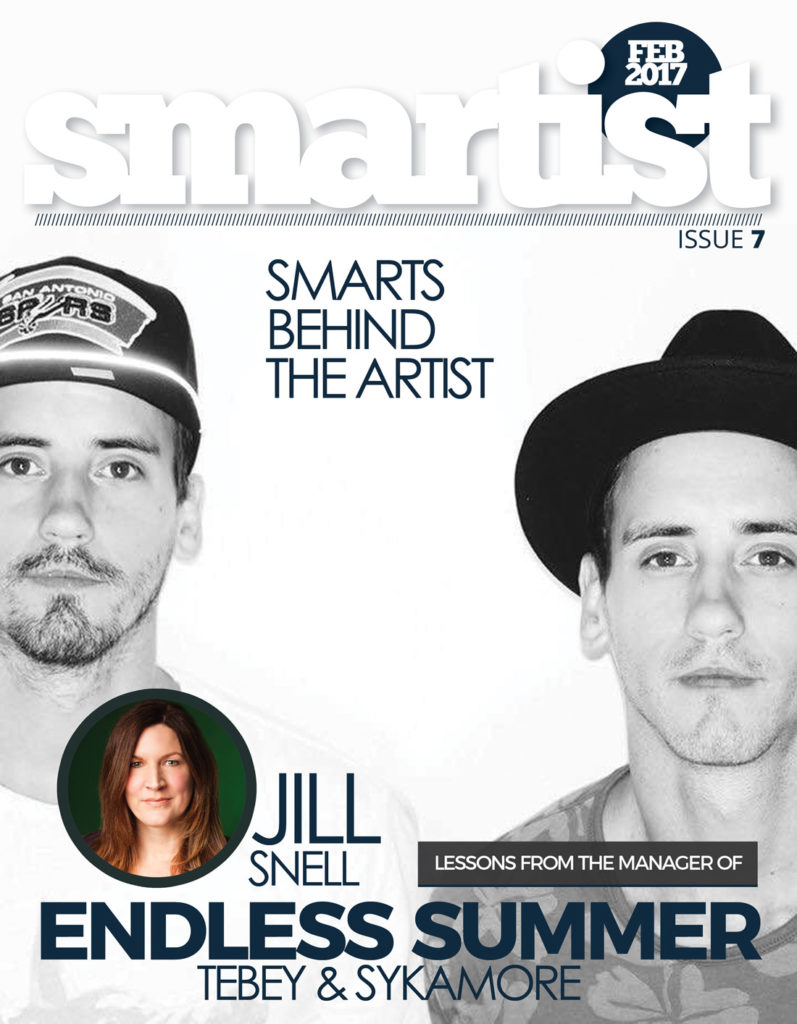
In this interview:
- How Jill started her first record label
- How she gains and pursues (or doesn’t pursue) clients
- The major differences between working with a major label, versus indie label or label services company
- Meeting with and negotiating deals with labels and publishing companies
- Advice for anyone wanting to start their own company
- The biggest lessons she’s learned, and more!
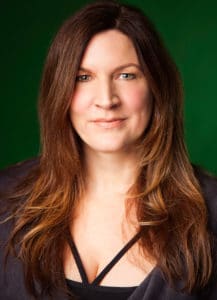
Aside from being super down to earth, genuine, and one of my new favourite people, Jill Snell has a story that I think you’ll want to read. For the first 15 years of her career, Jill worked in marketing for various major record labels including Island Records Canada, A&M Records Canada, and BMG Music Canada. After over a decade at BMG, Jill decided to start her own independent record label, in partnership with two of her colleagues. In 2003, they went out on their own and founded Toronto-based The Orange Record Label. Though a lot has changed since then, Jill’s drive as an entrepreneur remains.
For the past decade, Jill has owned her own artist management company, record label, and artist services company. Road Angel Entertainment (formerly Angeline Entertainment) has worked with many artists primarily in the country music genre including Paul Brandt, The Dungarees, MacKenzie Porter, Carolyn Dawn Johnson, Patricia Conroy, Emerson Drive, Little Big Town, Dean Brody, and many more. In the artist management division, Road Angel currently represents Tebey, Endless Summer, and Sykamore.

Sykamore is a young singer and songwriter from Alberta, Canada. She recently won $75,000 CAD, from earning 2nd place in a long, hard, radio-owned competition called Project Wild Country Artist Development. She’s had her music featured in TV, she has been featured in Travel Alberta and Tourism Calgary campaigns, has performed JUNO Fest, and performed with JUNO Award Winners. Sykamore is represented by Paquin Artists Agency.
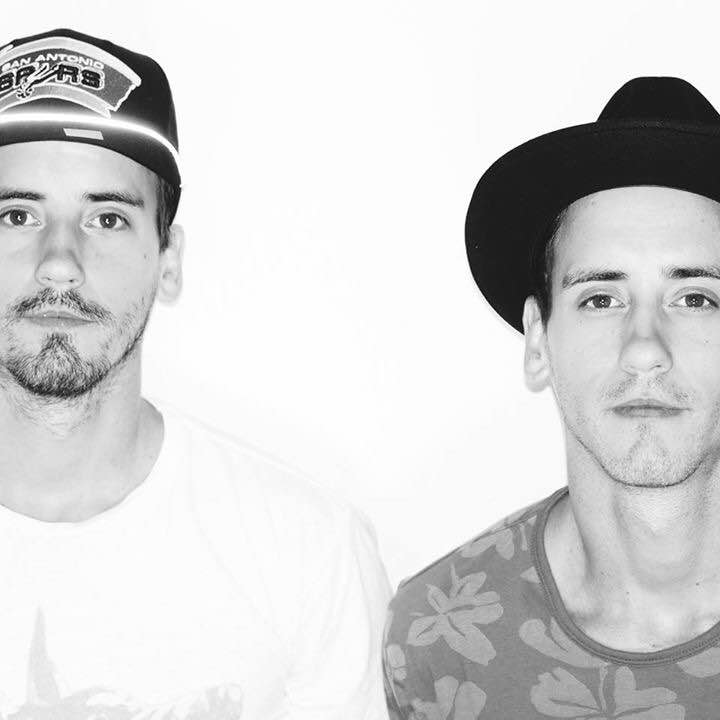
Endless Summer are Bob and Clint Moffatt, former members of The Moffatts (6 international chart topping albums selling over 6 million units across 40 countries from 1997 – 2001). They’re signed to Wrensong Nashville for publishing, and William Morris Endeavour Agency. Interestingly, there are only 3 Canadian country acts that have over 100,000 Facebook fans. Endless Summer started their Facebook fan page in May of 2016 and within 6 months they reached the 100k mark.

Tebey is a Canadian singer and songwriter signed to BMG Chrysalis Publishing Nashville, with awards and nominations from the Country Music Association of Ontario, the Canadian Country Music Awards, and Canadian Music Week. His most recent tour was sponsored by Coors Banquet, he’s had singles peak in top 5 at country radio, and recently earned a Gold single (40,000 units). Tebey is represented by Nick Meinema of United Talent Agency.
Want to become a professional, sought-after artist manager? Download our free artist management start-up kit to get started today!
What made you decide to leave your full-time major label career to start an indie label in the first place?
To answer that I should say that I actually started my music industry adventure at a small label (though not indie), Island Records, in my early 20’s. Every move I made from that point on had something to do with a person. I think that would be the most important theme throughout my career – mentorship and champions and people who are willing to endorse you. I think that’s one of the biggest things you can do for your career is to find those people who are willing to put their reputation on the line for you.
I had already been through a major merge when Island Records was purchased by Polygram. We had this fantastic office. I probably will never have a better time in my life than I had at when I worked at Island Records. It was my first job in the music industry; I worked in radio prior to that (CFRB). There were 8 of us in this amazing, town house near Maple Leaf Gardens. We had a very strong relationship with Chris Blackwell, the Founder of Island Records. I actually pitched him a country artist for a domestic signing, I think he appreciated my enthusiasm but Island wasn’t set up for the country business. He loved the Canadian staff and I think he tried to protect us when the whole merger went down. When it finally all got ripped apart, only 3 of us survived as actual Island employees, I was one of them. So they moved us into the A&M Records offices and a few of our other staff including our amazing president Lee Silversides became A&M execs. Eventually I was the last surviving member of the Island Records label team in Canada. Everyone else either left or was moved and I was the only person left. Which is crazy. I think it taught me how to be brave. I was getting calls from Paul McGuiness all of a sudden, for U2, because I was the only person in Canada that he could call.
At one time, I was in this limousine in NYC going to a listening party for Achtung Baby and I was the only person from Canada being brought to the States for that, and I remember thinking, “what the hell is going on, what am I doing here?” You know? I was 25, maybe 26. But at that moment I realized the ‘fake it till you make it’ thing was necessary to employ. “I’m here, someone believed I should be here, so I better believe in myself so that I can do this”.
One of my bosses from Island, Carol Wright, went over to head the marketing department at BMG, and she waited for the right position to hire me, as a marketing manager. I was grateful for that opportunity as I allowed me to get involved in country music and I loved working with Carol and Bob Jamieson. I stayed in that position for 11 years. I went through many changes and reported to 3 presidents (Jamieson, Paul Alofs, Lisa Zbitnew – Lisa became a long term mentor for me). I knew there was a rumbling of another merger, and I didn’t want to go through it again. I had gotten to the point where I had been in my position for so long, I didn’t want to move up, because the next position up was incredibly administrative and not as creative. I didn’t ever set my sights higher than that marketing role because it was what I was enjoying and what I was best at. A friend, who had worked at BMG, had moved to NYC and then back to Toronto along with another guy who worked at a successful Indie label had decided they wanted to start something and invited me to participate, so the 3 of us got together. We created a business plan, and I resigned from BMG. We took the business plan to Randy Lennox (former 20-year CEO of Universal Music Canada), he had always been a champion of mine, someone who was always really kind to me and we had a good relationship. He believed our business plan was a solid one, and decided to invest in us, and we launched The Orange Record Label. We had a studio, and the studio is still thriving today!
Aubrey (business partner) instigated this deal with Bell Sympatico, and they created and hosted the “Live at the Orange Lounge” Sessions. It was a great deal because we went from being this relatively small independent record label and now Bell was capturing these sessions in our very cool recording studio and podcasting them. We had Snow Patrol, Jann Arden, Avril Lavigne and many more successful artists. We could attract these big name artists because our media partner was so powerful. It really catapulted the name to a different level.
Did you already have artists signed to the label when that deal started?
We had a full roster pretty quickly. The 3 partners – we each brought in clients we already had strong relationships with. I brought in Paul Brandt and Jim Bryson, Aubrey brought in Jackalope and Melissa McClelland who I ended up being very close with. My other partner Steven brought in Billy Klippert and others so our genre focus, which initially was to be singer/songwriter-centric, was all over the map. This creative separation, along with other personal conflict was the end of my time with Orange – a short two and a half years.
We initially all had a vision of what we wanted Orange to be, but when you’re in an independent position you have to change with the times and evolve, because if you’re too rigid your business won’t grow and it can die because you’re too married to a certain idea. Although I also think it’s really important that you have a vision and you stay true to yourself and don’t try to represent something you can’t represent. When you have 3 strong-minded partners in one company you’re all going to have a slightly different vision of what you feel you want the essence of the label to be and it can’t be 3 different things. I think we all had 3 different visions. In the end I lost out because I had the least amount of investment in the company. It was unfortunate but I also believe things happen for a reason and even though it was a really difficult phase it was from this personally catastrophic time period that I really evolved into becoming completely independent. It was when Angeline, now Road Angel (Jill’s current company) was born. And then I was happier than ever.
One of the reasons I left BMG was because I was in my position for so long, that I had become very senior in my position (and potentially stubborn). I had been through so many department heads and I knew my job inside out and backwards and I didn’t like to play by the rules anymore, I found it really hard to report to people. I had out grown it; I had out grown office politics and having to sit within a little box and use all the systems that were put in place. I just couldn’t operate that way anymore. Because those jobs are such high volume (at major record labels), you have to stay very organized and it has to be quite formulaic otherwise you’ll drown in detail. And there’s a reason those systems are in place and I’m not saying they shouldn’t be there I’m just saying I couldn’t operate within that system anymore. I needed to bust out. I think that’s why independent is where I was headed.
I get that.
You have to be a certain kind of person to not have that fear (of going independent). But you can’t fling yourself into either. For me, it was a real evolution. Going from BMG to Orange, I was still pretty protected in a nice environment of smart people who had more experience than I did, and we had money. I mean we were funded. That’s a completely different situation than going out completely on your own. I had a very cushy side step before I went completely on my own. Sometimes you have to go through those experiences to actually realize you can be on your own and it’s not as scary as you probably envision it being.
When you first start your own record label, Angeline, how did that start?
I was completely not working, I had left Orange, I was in the middle of renovating a building with my husband. So I was very busy with all that stuff but it was literally the only time in my life that I didn’t have direction, and I was kind of scared. I was like “this is going to be a problem very soon”.
I’ll never forget the day that things changed, I was standing in my backyard watering the grass and my cell phone rang, it was my friend Peter Piasecki. He said “what are you doing these days?” and I remember going (laughs) “well, um, not a lot”. He said he was working with Midas (label out of Nashville) and they were looking for someone to work the label in Canada, specifically for the artist Emerson Drive. So I ended up making a deal with Midas thanks to Peter’s recommendation and then all of a sudden I had my first client. There was that and Carolyn Dawn Johnson who’s a long time friend and client through my days at BMG. We had a very close relationship and she was making a new record and wanted to work more independently and wanted to make a change. Her manager at the time was Scott Welch who had been involved in Alanis Morissette’s management during the Jagged Little Pill days so he had a lot of clout, and very long story short, he told me he would help me launch my label if I did a joint venture with CDJ and Universal. So with Angeline, really my first signing was Carolyn Dawn Johnson in a joint venture with Universal for her album Love & Negotiation. But for the rest of my releases, I did a deal with UMG sister company – Fontana North. Grant Dexter was kind enough to advance me some money to start my label and I stayed there for quite a long time working alongside another good egg (and friend) Matt Smallwood.
I have to say it was probably Scott and Carolyn that put me on the map. And Emerson Drive and Midas Records in Nashville had become my first contract. Basically, I knew Angeline was going to become what Road Angel currently essentially is; a bit of an a la carte company. I was a consultant, I was freelance. I could either sign you to my label, or I could also just be a contract marketing person.
I guess that’s what opened your doors in the first place financially because they came to you with a paying contract.
Midas paid me well, they paid me enough money that I could get by month to month with just the amount that they retained me for. I ended up working Adam Gregory for them as well. Somebody who I met through the Midas connection (Neal Spielberg) introduced me to Derek Simon who was a VP of Equity Records in Nashville (co-owned by Clint Black), and they were looking for someone to be a point person for their American artists in Canada. So I ended up working for Little Big Town through Equity Records. This was before they moved over to Capitol. That was a great experience – they were more of a tastemaker band at that point, they hadn’t exploded into what they are today and they are lovely people. Working with Equity also started putting me on the map more as a consultant. I had spent so many years building Nashville relationships with my BMG work because I was the Nashville point person for 10 years. So now I got to refresh all those connections again.
Usually new relationships come from the relationships I already had. And that’s always been true for me even now to this day; I have never had to pursue an artist. That isn’t meant to sound egotistical, it’s more like things always just happen for a reason. There’s always some gel and some relationship that introduces me to an artist and just feels like the right fit. I’ve never checked a radio chart and thought “I’d really like to work with so and so” and started to pursue them or poach them. Every relationship I’ve had has come to me in some way shape or form. That’s not to say that I haven’t had an introduction and then worked hard to secure it. I worked really hard to secure Dean Brody. But Dean Brody came to me via a phone call from someone I hadn’t talked to in over 10 years! His manager at the time, a nice guy named Clark Beavon. I hadn’t talked to Clark since I worked with Steve Wariner at Arista Records in like, 1940. I have no idea when… it was a long time ago anyway.
He called my land line, in my house, and said I got your number by asking various people and I remember working with you. I have this Canadian client who has zero representation in Canada and I think you should meet him. At the time I was doing some contract work with Julien Paquin (Paquin Artists Agency) and also with Ron Kitchener (RGK Entertainment), and I went down to Nashville with Julien because I was helping him shake the trees in Nashville to see what Nashville-based Canadian artists he might be able to represent in Canada. One of the meetings we took was with Broken Bow Records where Dean was signed. Then I also set up a meeting with Clark and Dean. I heard his music, I had a feeling about the guy, and I said to the label “you have to allow this artist to find relationships in Canada”. Broken Bow was literally just not a fan of Canada at that time. A senior exec called it (Canada) an albatross to me one day. That was a GM of Broken Bow that is no longer there. In their defense, they had spent a lot of time trying to develop Jason Aldean and Craig Morgan in Canada and they had no success to date, in fact they told me they lost money every time they’d try to send someone over the border. So they didn’t feel like investing money In Dean Brody in Canada.
One day they called me up and said ok we’re going to hire you but we’re only going to pay you to do radio promotion. And I didn’t even do radio promotion. But I had spent so much time pursuing a relationship with Dean that I finally said ok I’ll do it. Then I thought Oh God what am I getting myself into but it was another life lesson – sometimes you just have to do what’s necessary to secure something and you can change it later.
So I ended up working radio and my first single was Brothers, which ended up being Single of the Year at the CCMA Awards, so my radio career started out on a high note but it wasn’t planned that way. I got very lucky. We went on to do a label & management deal with Ron and the rest is history.
When you say people come to you, and then you work on securing it, what is the process?
First of all, it’s finding out if it’s a fit. Feeling that you fit with each other is important. I’m cautious about jumping into deals with people because it protects both the artist and you to not jump in until you really get to know each other. It’s not just about the music. But you do have to believe in the music, and you have to believe in the person’s raw talent and their drive.
But, if they’re not a fit, if your personalities or philosophies aren’t a fit it’s not going to work. Especially if you’re working in a small little team – the synergy of a good working relationship can change everything. Somebody’s work ethic, on the artist side, can change everything. I’ve worked with artists that are insanely talented but don’t have any kind of business sense for how the industry really works, and therefore they couldn’t be successful. They didn’t have all of those elements that you really need to become a successful artist.
And I’ve had other artists that, at the time I was working with them, weren’t the most talented people. Certainly talented, but not to the point where I was like “omg this person is magic” but their work ethic was amazing and they had their eye on the ball all the time, so strong, that they had more success than other artists because of that drive. I think they have to be a combination of those things.
I think how I sign on with somebody, is that I usually get introduced to them either one on one or by a member of their team. I listen to the music, I try to spend time with them to see what their background is, what kind of things they’ve already done and achieved in their career up until that point. I figure out what they need.
More recently, I now manage Endless Summer, comprised of 2 of The Moffatts (family country band turned successful pop act). That relationship came from me being in Nashville with Sykamore. We were working through publishing meetings, and one of the publishers I saw is a very good friend of mine, Steve Markland, who runs Downtown Music Publishing in Nashville and he said to me, “I’ve got this amazing client who are a country duo from Canada. Do you have an hour to spare while you’re in town to sit down and give them some advice about Canada? They are Canadian but haven’t been in Canada in a really long time and they want to start to figure out how to navigate it.” I said sure. I sat down with Steve and their co-publisher (Ree Guyer from Wrensong), and they introduced me to Clint and Bob Moffatt, who said, “we’re just going to play you a couple of songs and then we’ll chat”. So they started playing and it literally took me 10 seconds to fall in love with them. I was mesmerized. In my mind I was thinking, “I know they’re just looking for advice, but somehow I’ve got to navigate this relationship and make it into something I can be involved in”. And that’s one of those situations where I knew right away but I knew I couldn’t rush it because they didn’t know what they were looking for yet.
So I gave them as much good advice as I could that day. I got back to Toronto and start writing them, suggesting what they should do to start setting up their record launch, their career launch in Canada as a new country duo. Then I said, “Hey why don’t you hire me to plan you an industry introduction trip to a bunch of record labels, and so on. So we did that, and they came to Toronto, and we took a ton of meetings, one of them was with Slaight Music, who also fell in love with them very quickly and decided to invest in them. A lot of things were also starting to happen in Nashville, and a lot of labels were coming forward. So we decided to slow down in Canada and just put a single out independently and start building a team. We decided to hire a radio person (because I’m not doing radio promotion anymore). I have an enhanced distribution deal with Warner and they were handling some of my radio promo, but at this point I was hiring more independent, because we wanted to keep it independent. So we hired Rob Chubey who was a former promo guy from the EMI days who worked The Moffatts. It was all kind of fun because Derrick Ross at Slaight Music was with EMI back in the day, and Charlotte Thompson (owner of Red Umbrella PR) was the publicist at EMI. We didn’t necessarily try to put that whole “Moffatt” team together but it made sense because they were all fans and they were all really excited about the new music.
We put together a cross-Canada promo trip from Ottawa to Vancouver (we haven’t done the Maritimes yet but we want to). At that point we’d been working together for 8 months and it had been going so well that they asked me to manage them for Canada. They don’t have a manager in the US. I’m helping out with their publisher (Ree Guyer) in the US to help cover the bases. That’s what we try to do, we all try to wear a bunch of hats. We all = whoever is on the team. We try to cover off what isn’t being covered until there’s a need to cover that role with someone officially. We’re not pursuing a US manager until there is a need for it. Right now Ree and I can cover all of those things. We have the skill sets and we know what we’re doing. There will be a moment in time when we’ll say yes now we need an official US manager, and that’s when that relationship will be pursued. We do have an agent however, Nate Towne from WME Nashville.
Developing a radio tour, that’s part of your services?
It depends on the relationship. Every artist relationship I have is different and the structure of the deal is different. I now manage 3 artists, and those are fairly traditional management deals. But anyone else that I work with and have a consultation with, it’s always a different bag of stuff. Basically, someone will need all radio focus. There was a time period from meeting Dean Brody until I did my deal with Warner 3 years ago, so probably 5 years, I worked radio myself and had a lot of success doing it. But it was something I did out of necessity with Dean and kept doing it because it was a service that everybody needed. But it was never something I really wanted to do and never something I was super comfortable with. So when I did my deal with Warner and negotiated for Steve Coady’s team to start doing radio promo, that was a huge weight off for me, because it let me do the things I’m best at. I was very grateful to Steve Kane and Coady for this creative deal. Not to say I wasn’t good at radio promo it just wasn’t in my comfort zone. Radio promo is still something I oversee very heavily but I’ll hire it out. I’ll hire an indie, and guide them and provide them with tools.
When it comes to a promo trip, we work together (myself and the promo person) to put together logistically, a promotion trip that will work. Who contacts the stations? I would rely on the promotion person to do that. Really long promo trips are a bit of a jigsaw puzzle. You not only have to make it work geographically, you also have to hope that those radio stations are available on the exact day and time that you need them to be, and that they’re even interested in seeing your client. So it’s tricky. It’s one of the toughest things to put together. Endless Summer’s trip, I think we maybe missed 3 reporting stations across the entire country that just weren’t able to accommodate us at the time we needed them to.
What do you think the pros’ are to a services company, as opposed to a standard record label?
Being flexible is a real pro. You can put together a really effective team for each client. It’s more work, I believe, but what you do get is a really passionate and dedicated team for your client. There are real advantages to major labels, obviously, and there are real advantages to being independent. With a major, you get the weight of that company and a lot of staff and resources and leverage. What they don’t have is the ability to be very micro-focused on one client, and have that client be the super big priority for them. When you’re independent, that client is always a priority. Each team member is very accountable because you’re being paid, whether you’re a publicist, or radio tracker, or marketing consultant, or manager, you’re extremely accountable because it’s just you and your client. There’s a real responsibility to that, you can’t hide behind the layers of a record label. I don’t know if that’s the right word.
I remember being a marketing manager all those years at BMG; you literally churn out the marketing plans. They’re all specific and you try to make them tailor-made for each artist, but there’s only so much you can do with the volume of clients you’re responsible for. If an act did not become a priority, and if you’re in middle management, you don’t feel as responsible because the order would have come from above you. Not that everyone from top to bottom doesn’t want to make every artist’s dreams come true but there’s a time and money reality in play. There’s some justification to not making every artist a priority at a major whereas you can’t do that when you’re independent.
When you work at a record label, you’re not directly connected to the artist. I feel like that changes the way you work on their projects.
Yeah, absolutely. I mean I worked for 11 years at BMG. I was responsible for RCA New York, RCA UK – I had American clients, I had UK clients, I had some Australian clients, and all of my Nashville clients. And then I had a Canadian roster, and of course you were closer to the domestic acts for sure because you just saw them more often, and you actually got to spend quality time.
There are tons of artists over the years that I never got to meet. And it does make a difference. When you have a personal relationship with that artist, with that artist’s family. You feel really responsible. Every decision you make is with all of that in mind and you can’t run from it. You have to be honest and you’re in it with that person. Very intimately.
How do you decide on your pricing for your services? Especially in the first place. Did you just know how much these things were supposed to cost?
In the beginning it was actually kind of hard to come up with pricing.
Radio services are one thing, they’re fairly standard. There is an industry standard in each genre, I think, for what you can charge. I think now country radio specifically has become such a really developed format in Canada that radio trackers are charging more money so it’s getting harder for artists to be able to afford the ever increasing price range. So I try to stay somewhere in the middle.
For marketing, I try to establish a monthly fee. It keeps me safe, and makes it easier for the artist to get their head around and manage. Sometimes I base it on the resources of the artist. If they have good resources, I feel like I can charge what I really need to charge. Generally I’m a person who under charges. I have a bad habit of working for free for a long time before I establish a rate with a client. But sometimes artists have literally no money. I’m working with one of those clients right now who have re-mortgaged their house to be able to make an album. There are other clients who have access to government grants and that’s very helpful. I have other clients still who have alternate means of income, maybe they’re a writer so they have good publishing income and they can afford to spend money on marketing and promotion. It really varies, although I’m going to stay within a range that makes sense for everybody.
Sometimes in management, I start out managing with a stipend, as opposed to a commission because it makes everyone feel a little more comfortable in the beginning. It doesn’t commit the artist or me to a long term deal that we can’t get out of if we’re not happy working with each other. So I’ll often start out as a management consultant and then evolve into a traditional management deal.
Basically, for artist who is really, really strapped for money, I try to work within their budget. However, I feel like not having access to some kind of financing is really difficult. If you can’t afford to compete with the level of recording and marketing that other artists who are having success are able to do, you’re going to suffer on some level. It costs money to put music out there to the world. It’s really challenging if you don’t have that.
I want to ask you a little bit about the actual marketing process. It’s obviously a very creative process, but when you first decide you’re going to work with an artist, and they’ve hired you to market their next album, what is the general strategy?
Before we even get close to the marketing and promotion phase for an artist, we spend a lot of time working on branding and messaging.
The first thing we do is talk about music. What music are you releasing? If it’s not recorded yet then I participate in song choice and producer choice if my help is needed. Which songs will be singles and how will those sound compared to songs not ever intended to be radio releases but just for your fans? How do you want to look (imaging) and what message does your branding transmit to potential fans? Does your branding resonate with existing fans and draw news ones. What will your graphic design look be? What biographical information do you want people to know? Are you able to afford visual tools i.e. photos and video? Who’s going to execute these things?
Only when all of these questions are answered and decisions are made do you start to talk about a timeline with an artist. Then you can plan what marketing and promotion tools will be accessed around each timeline section – be it radio releases and pre-release activity; album or EP release plans; tour date marketing; publicity for tours and product releases; social media around each of these things or overall outreach to fans.
We figure out from that planning meeting, to when we’re going to service a particular single to radio, what is that timeline? Is it a suitable timeline? What else is going on at that time of year? What’s the traffic like a radio? I have to look at my own workload; I don’t want my own clients on top of each other at radio. Then we look at it on an annual basis. We put together a full year calendar. Let’s say we want to put a single out in February, we’ll want to put another one out 4-5 months later. We’ll check where does that single sit in relation to awards-season? The CCMA Awards are a very important event to Canadian country artists. Where do we want to be plan-wise heading into CCMA season? The JUNO’s come into play if you artist is at that level. So we start to plot a timeline. Within those chunks of time between singles, we talk about other tools. Are we going to create a music video and where is that funding coming from? What is our social strategy like between singles?
Interestingly, for the EP I was involved with last year with Paul Brandt, we treated each single like its own separate project. There was no full album. There did end up being a digital EP and vinyl. But we went out with the first single and we did a marketing plan about that one single. We did completely unique creative, video, social media strategy for that single. Then when he was ready with the next single, we created a whole new plan around that. It was neat because we divided it up by song as opposed to by album project. In the end we created bundles that consumers could physically buy at shows because he did extensive touring, or they could buy on iTunes.
Would you hire a social media person to hire with a social media strategy specifically, or is it all you?
Sometimes we do hire social media people. I wish I could hire a social media person full time. It’s really such an important thing now, and not just someone who can post, but someone who really understands it on a much deeper level.
What we do is we try to create a look for all the social media postings. We’ve been doing graphic design work for everything that gets posted so that it’s very professional and polished. I’ve been lucky that my assistant for the last 5 years (Kayla Tinson, now Kayla Gumb) has been able to create those internally for me instead of farming them out to a graphic designer.
With my longest term client Tebey, we recently did a tour with Coors Banquet as a sponsor. It was entirely his idea and if worked out really well. We were able to use the Coors Banquet branding to run contests through Tebey’s social media and radio. That was a great creative opportunity to use another brand to reach his existing fan base, while creating new fans through brand association.
You were involved in the negotiation of the Coors Banquet deal I’m assuming? Can you teach us a bit about negotiating?
Negotiating is sort of understanding the threshold of whomever it is you’re negotiating with and how far you can push without completely messing up the deal. Also being a creative dealmaker is important in negotiation. A lot of people can’t see beyond traditional deals and there is so much room to be creative when negotiating these days.
More specifically, when you went down to Nashville to sit down with Publishers and Record Labels trying to develop a team for an artist, how do you approach those meetings?
I guess the best example for that would be Sykamore, a client that I manage. She’s an incredible songwriter, she writes 100% by herself. This is an easier thing to pitch to Nashville publishers, because it’s very clear what her writing ability is, there’s no co-write and no question as to how much of her influence went into each song. We probably met with 15 publishers, which was challenging because I had never met most of these people and had to figure out how to get in the door and publishing was not an area I had a lot of experience in.
So, we set up an amazing schedule and blindly walked in, all they knew was what my client looked like and a couple of samples of her writing. My goal initially was to wow them with Sykamore’s talent and get them intrigued in the pure art and not talk about money or anything else, we could tackle that when we figured out if there was any interest. We did get a lot of interest. There weren’t initially any contract offers, but there was a lot of “hey come back and we’re going to set you up with our writers”. It’s a process. You want to make sure you click with those people, whether it’s through your own relationship as a manager, or your artist’s talent. Whatever it is that makes them want to continue talking to you, that’s the goal of the first meeting. And by offering co-writes that publisher is not committing their money to your client, they’re committing the time of their established writers that they already represent. So that was the next step. They get to see your artist in action and if the writers do well together they might get a song to pitch – a win/win. From there we did get a publishing offer. It’s an incredible situation, a grouping of people we could not have dreamed of if we tried. And again, this happened ultimately with the help of an influencer – in this case it was Rhett Akins.
When you’re dealing with anyone at this level of business, you have to get a lawyer involved. We asked around to a lot of people we respect in Nashville and got recommendations for lawyers, and we chose one based on our level of where we are coming into the industry. We found a lawyer we felt really good about and she immediately became our proxy for negotiation. She and I went through the contract in great detail. I knew basically where there might be room for negotiation and made my suggestions, and then she, who really understands this business so intricately, made many more recommendations where she believed we had leverage. We’re now waiting to see what happens.
Obviously the more senior the manager, and more negotiations you’ve been through the more savvy you’re going to become at understanding where the thresholds are; where to fight and where to let things go. There are things that are definitely worth fighting for in the long run and there are things that aren’t. I think some new artists make mistakes by not being super careful about details because they feel lucky to have a deal. But you never know what’s going to blow up. So you’re best to take really good care to watch out for those details that will really affect your client’s life if they become a really big deal.
What’s your advice for someone wanting to start their own indie record label or starting his or her own record label services company?
I think that my advice would always be to rely on really good relationships that you have out there. It’s such a people business. I mean every client relationship I’ve ever had, there was somebody that believed in me and trusted me at the beginning of every deal. If you want to start out, look for that very first relationship that feels like the right fit, and not just that you like a song. I find that with the clients that I choose, there’s always something else, other than just the music. Perhaps there’s someone on their team that I’ve always wanted to work with.
You need to create an environment that you’re going to be able to grow. For me, I created a record label to be able to service my clients. If it’s just you and an artist, where do you go from there? You have to be able to get their songs to radio; you have to be able to get their music to consumers. Until very recently with companies like TuneCore and Believe Digital there had to be a physical distributor.
If your strength is in radio promotion, or your background is in publicity, pick something that’s micro focused like that. If you’re a manager, you really have to have all of your tentacles out there in a lot of different places, and you have to understand what all of those different people do for an artist.
I started with Angeline, and Road Angel (which was initially co-founded by Jill and Ron Kitchener), because we felt like there was room in the market for an artist services company that was a la carte, as opposed to a label that puts a lot of money behind license deals. The difference being that the artist pays as they go as opposed to building up a large recoupable account.
Choose your role within your comfort zone initially, with the understanding that you’ll probably grow and evolve as you jump into the independent world.
I like to call myself a project manager when I’m not managing specifically, because a project manager is the glue that holds everything together in the middle. You know how to put your arm out there and pull in that service that the artist needs at that time, and when there’s a need for another service, you know how to put the team together. That’s project management no matter what industry you’re in.
What is the biggest lesson you’ve learned in your career?
Maybe… protect yourself. It’s really easy to begin a relationship and just start rolling and not think about what might happen if things go wrong, or go really right. When I say protect yourself I mean look to the future as soon as you start working with someone. Put a contract in place or have an agreement so that you know where you stand. If things go really wrong you can get out, or if things go really right you’re protected and there’s no question as to what’s going to happen. You do not want to try to chunk things together after the fact. Because money is the one thing that can pull people apart. So it’s best to have it iron clad and put to bed in the beginning.
It’s the same thing as writers walking into a room. If you haven’t established before you walk in that room what the split of the song’s going to be then all hell can break loose down the road if that wasn’t negotiated up front.
Make sure you understand what your financial relationship is going to be with your client.
Whose business do you want to know more about? Tell us at hello@smartbandmanagement.com or check out more interviews at smartbandmanagement.com/interviews
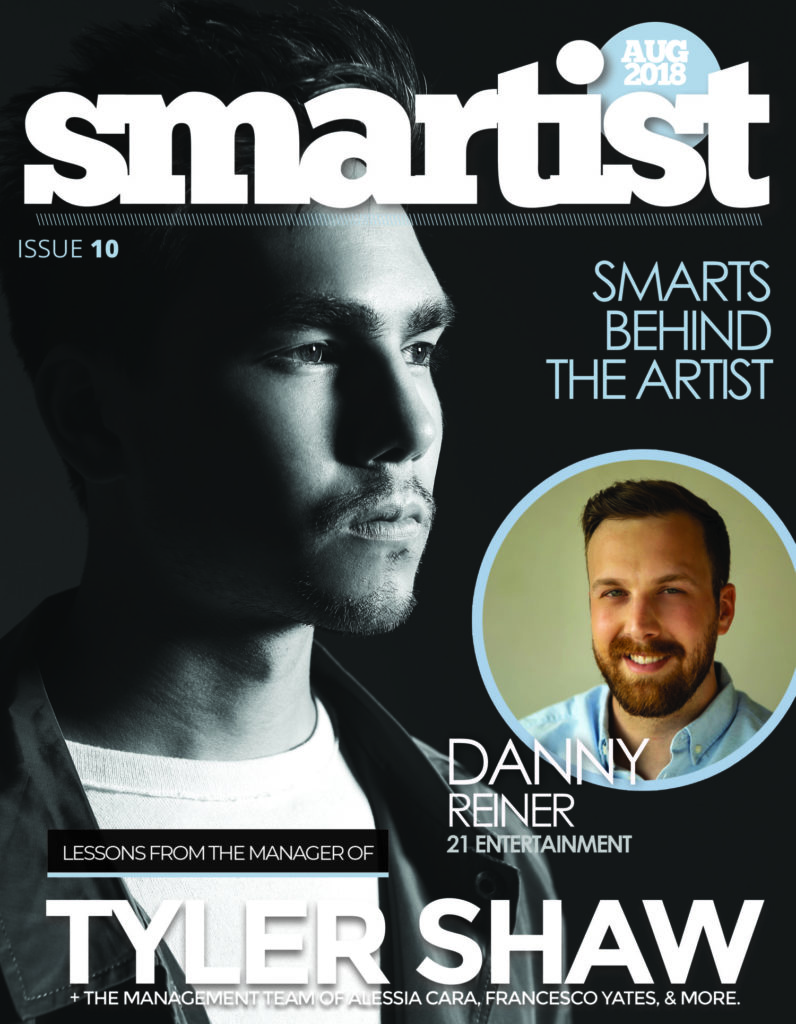
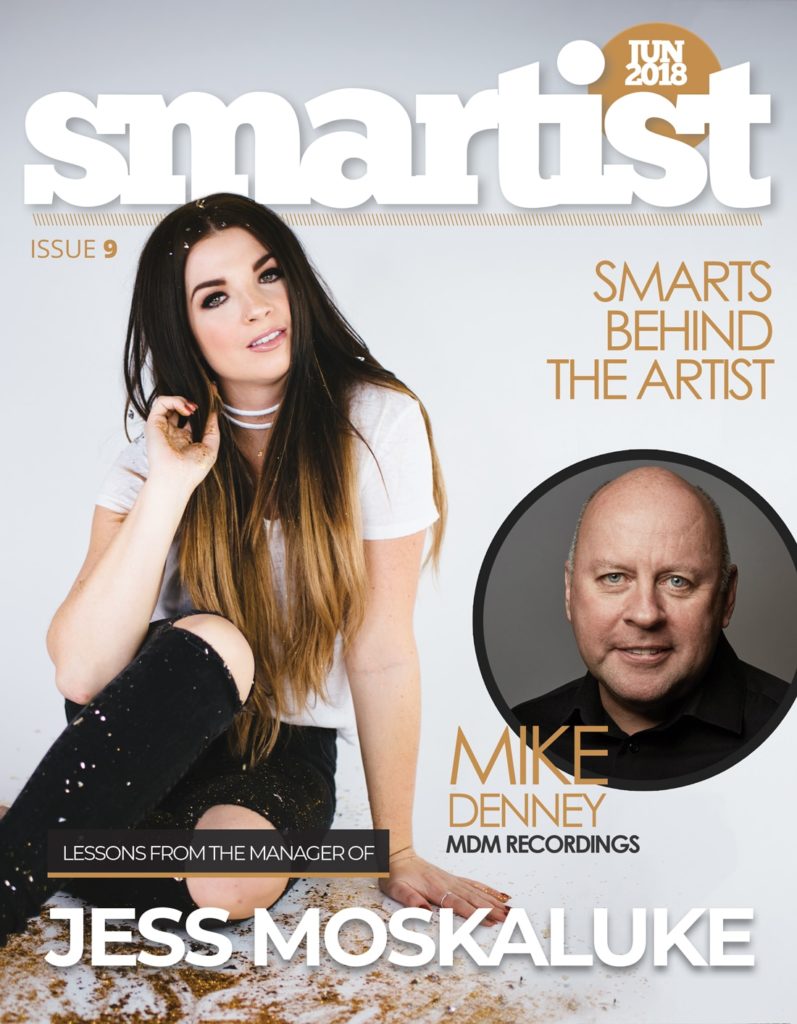
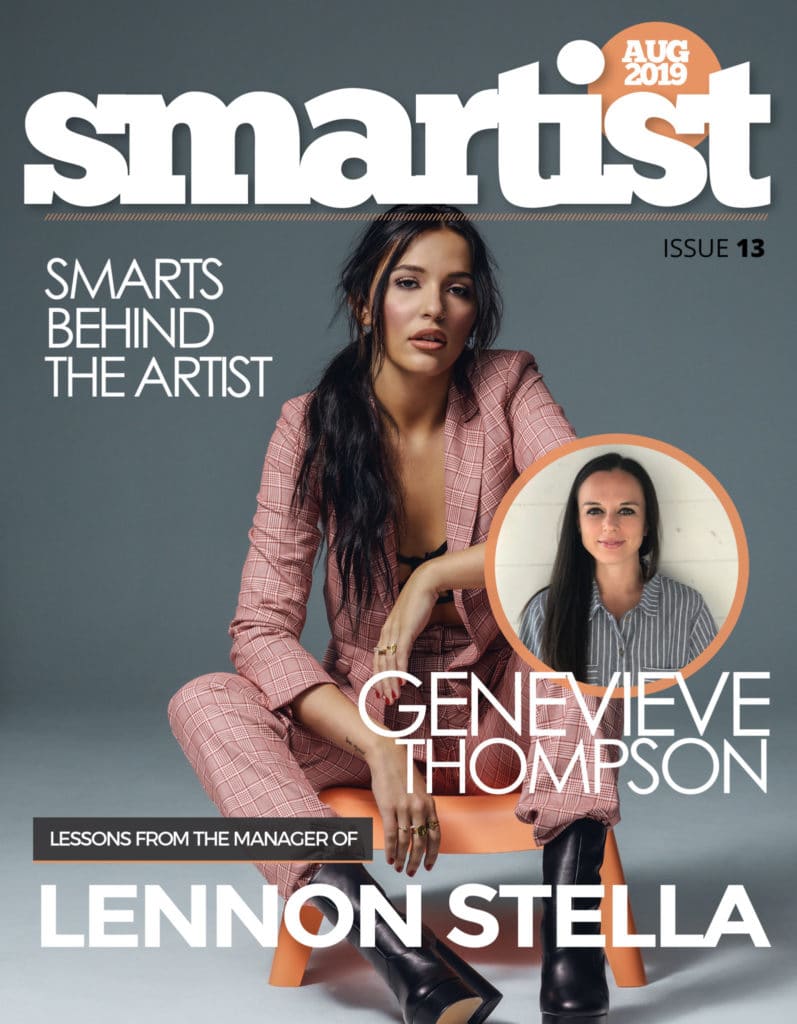
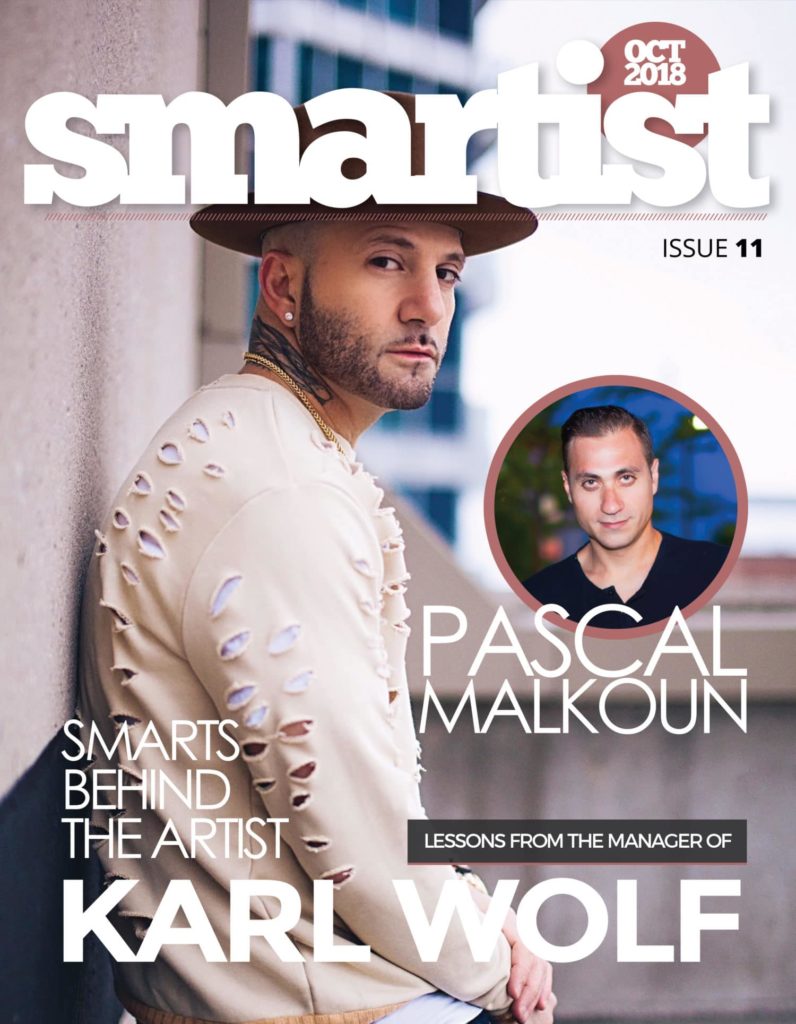

Responses